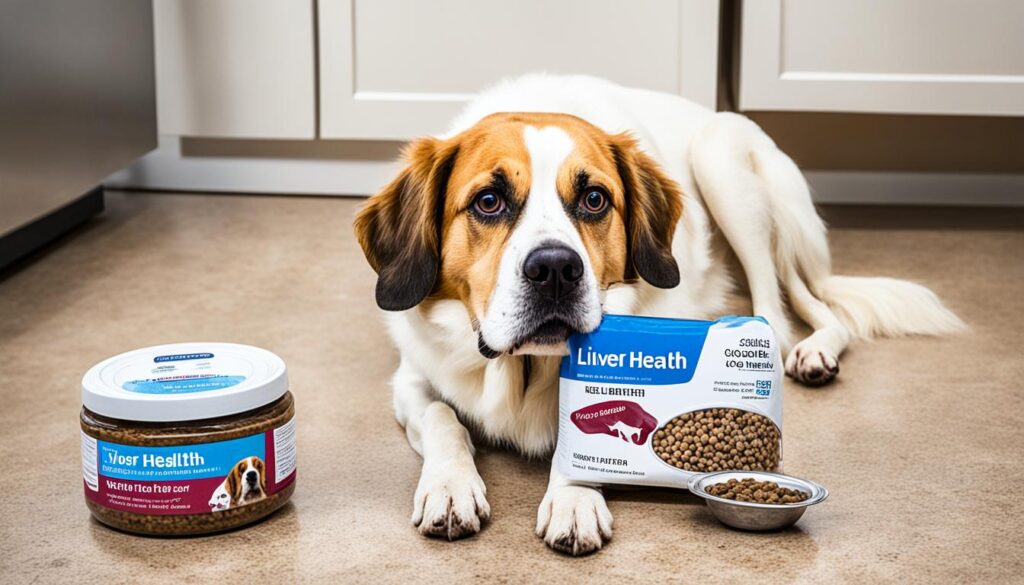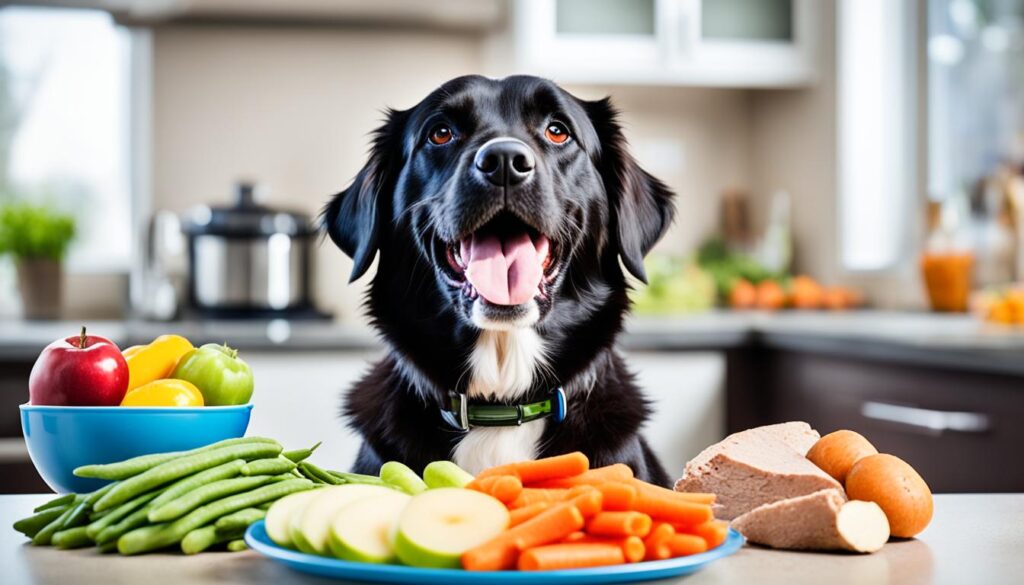Best Diet for Dogs with Liver Issues
The liver is a vital organ in a dog’s body, responsible for digestion, detoxification, and energy regulation. A poor diet and environmental stress can damage the liver. Inflammatory liver diseases are caused by liver stagnation. A dog’s diet plays a crucial role in liver disease, and real food meals are recommended for optimal nourishment. Symptoms of liver disease in dogs include loss of appetite, weight loss, vomiting, lethargy, and jaundice. Basic blood tests can indicate liver abnormalities. A liver disease diet for dogs can help improve liver function and promote a healthier life.
Key Takeaways:
- Proper diet is essential for dogs with liver issues to support liver health and overall well-being.
- Real food meals are recommended for optimal nourishment.
- Symptoms of liver disease in dogs include loss of appetite, weight loss, vomiting, lethargy, and jaundice.
- Basic blood tests can detect liver abnormalities.
- A liver disease diet for dogs can help improve liver function and promote a healthier life.
The Role of Diet in Liver Health
In holistic traditional Chinese medicine, the liver plays a vital role in providing energy and releasing blood to the body. Qi and Blood work together to supply energy and nourishment. It is crucial to maintain a healthy diet to support liver function and prevent liver-spleen disharmony and gastrointestinal (GI) upset in dogs with liver problems.
A poor diet can exacerbate liver issues and impact overall health. That’s why it is important to feed dogs with liver problems a diet consisting of human-grade, real food that provides optimal nutrition and is easily digestible. Cooked food is generally more gentle on the liver compared to raw food.
Beneficial Ingredients for Dogs with Liver Problems
When considering ingredients for a liver-friendly diet, specific foods can provide essential nutrients and support liver health:
- Lean Ground Beef: Rich in protein and essential amino acids.
- Chicken and Turkey: Lean sources of protein that are easy to digest.
- Eggs: Provide high-quality protein and essential nutrients.
- Brown Rice and Millet: Gentle carbohydrates that support a healthy stomach and spleen.
- Chinese Eggplant, Carrots, and Broccoli: Liver tonic vegetables that help promote liver health.
These beneficial ingredients provide the necessary nutrients and support liver function in dogs with liver problems.
Incorporating these ingredients into a well-balanced and nourishing diet can help address liver issues and improve the overall health and well-being of dogs with liver problems.
“To support liver function, a diet consisting of human-grade, real food is important.”
Recognizing Liver Disease in Dogs
Liver disease in dogs is a serious condition that can have a significant impact on their health and well-being. To ensure early detection and proper treatment, it is essential for dog owners to recognize the signs and symptoms of liver disease in their furry companions.
The most common signs of liver disease in dogs are primarily associated with the gastrointestinal (GI) system. These include:
- Loss of appetite: Dogs with liver disease may experience a decrease in their appetite.
- Weight loss: Unexplained weight loss can be a noticeable indicator of liver disease.
- Vomiting: Dogs with liver disease may vomit frequently or consistently.
- Lethargy: A lack of energy and overall lethargy is often observed in dogs with liver disease.
- Jaundice: Yellowing of the skin, gums, and eyes is a common symptom of liver disease.
- Ascites: The accumulation of fluid in the abdomen, resulting in distension.
If you notice any of these signs in your dog, it is crucial to consult with a veterinarian for a proper diagnosis. The veterinarian will conduct a thorough examination and may recommend specific tests to confirm liver disease.
Basic blood tests are commonly used to evaluate liver function in dogs. These tests can reveal abnormalities in liver enzymes such as ALT, ALKP, GGT, and total bilirubin. Additional diagnostic imaging, such as ultrasound or radiographs, may be employed to assess the overall condition of the liver.
Early detection of liver disease allows for timely intervention and appropriate management. It is important to remember that many of these symptoms can be indicative of other health problems as well. Therefore, seeking professional veterinary advice is essential for an accurate diagnosis and tailored treatment plan for your beloved pet.

| Signs of Liver Disease in Dogs |
|---|
| Loss of appetite |
| Weight loss |
| Vomiting |
| Lethargy |
| Jaundice |
| Ascites |
The Connection Between Diet and Liver Health
The liver is a vital organ that is intricately connected to every other organ in the body. It plays a crucial role in numerous physiological processes, including digestion, detoxification, and energy regulation. Therefore, it is essential to prioritize the health of the liver to ensure overall well-being.
Research has shown a strong connection between diet and liver health. The foods we consume can either support or impair liver function. A diet rich in real, quality ingredients provides the necessary nutrients and antioxidants to support optimal liver health. On the other hand, processed kibble and canned foods, which often contain additives and preservatives, can be pro-inflammatory and contribute to liver damage.
Good nutrition and healthy digestion are key factors in promoting liver health. A balanced diet that includes lean proteins, whole grains, fruits, and vegetables provides essential nutrients and antioxidants that support liver function. Additionally, foods that are high in fiber help maintain a healthy digestive system and prevent the accumulation of toxins in the liver.
When designing a liver-friendly diet, it is important to consider the specific nutritional needs of the liver. Certain nutrients, such as vitamins A, C, and E, as well as essential fatty acids, have been found to be particularly beneficial for liver health.
“A well-balanced diet that includes real, quality ingredients is essential for promoting liver health and overall well-being.”
Moreover, a diet that is low in saturated fats and refined sugars can help prevent the development of non-alcoholic fatty liver disease (NAFLD) and other liver conditions. It is also important to limit the consumption of alcohol, as excessive alcohol intake can lead to alcoholic liver disease.
Incorporating liver-supportive foods into a balanced diet is a proactive approach to maintaining liver health. Some of these foods include:
- Fatty fish, such as salmon and mackerel, which are high in omega-3 fatty acids that reduce inflammation and promote liver health.
- Leafy greens, such as spinach and kale, which are packed with antioxidants and fiber to aid in liver detoxification.
- Cruciferous vegetables, such as broccoli and cauliflower, which contain compounds that support liver enzyme production and detoxification.
- Citrus fruits, such as oranges and lemons, which are rich in vitamin C and help stimulate liver detoxification processes.
- Herbs and spices, such as turmeric, ginger, and garlic, which have anti-inflammatory and antioxidant properties that benefit liver health.
By making conscious dietary choices, individuals can optimize liver function and promote better overall health. To visualize the connection between diet and liver health, refer to the table below for a summary of liver-supportive foods:
| Liver-Supportive Foods | Benefits |
|---|---|
| Fatty fish (salmon, mackerel) | High in omega-3 fatty acids that reduce inflammation and promote liver health. |
| Leafy greens (spinach, kale) | Rich in antioxidants and fiber to aid in liver detoxification. |
| Cruciferous vegetables (broccoli, cauliflower) | Contain compounds that support liver enzyme production and detoxification. |
| Citrus fruits (oranges, lemons) | Rich in vitamin C and stimulate liver detoxification processes. |
| Herbs and spices (turmeric, ginger, garlic) | Provide anti-inflammatory and antioxidant properties that benefit liver health. |
By incorporating these liver-supportive foods into a well-rounded diet, individuals can take an active role in supporting liver health and promoting overall well-being.
Foods to Feed and Foods to Avoid
When planning a diet for dogs with liver issues, it is important to feed them human-grade, real food that is easily digestible and gentle on the liver. Here are some recommendations for the best food for dogs with liver issues:
Foods to Feed:
- Cooked lean meats: Ground beef, chicken, and turkey are excellent sources of protein for dogs with liver problems. They are low in fat and provide essential nutrients.
- Gentle carbohydrates: Foods like brown rice and potatoes can provide energy while supporting the stomach and spleen. These carbohydrates are easy to digest and won’t overload the liver.
- Liver tonic vegetables: Chinese eggplant, carrots, and broccoli are rich in antioxidants and vitamins that can support liver health. Including these vegetables in your dog’s diet can provide additional nutritional benefits.
In addition to these foods, it is recommended to provide a balanced and complete diet that includes all the necessary nutrients for liver support. Choose high-quality ingredients and prepare meals that are appropriate for your dog’s specific needs.
Foods to Avoid:
“Poorly chosen foods can worsen liver problems in dogs. It is important to avoid the following:
- Processed food: Commercially processed pet foods often contain additives and preservatives that can be harmful to dogs with liver issues. Opt for homemade meals or high-quality, natural dog food.
- Large meals: Feeding large meals can put excessive strain on the liver. It is recommended to divide your dog’s meals into smaller, more frequent portions to ease digestion and minimize liver workload.
- “Hot” foods: Lamb and oats are considered “hot” foods in traditional Chinese medicine, meaning they can cause inflammation and contribute to liver stagnation. Avoid these foods for dogs with liver problems.
- Stagnating or damp foods: Dairy products and high-fat foods can cause stagnation and dampness in the body, which can be detrimental to the liver. It is best to avoid these types of foods to support liver health.
One important consideration when feeding a dog with liver disease is choosing a low protein dog food. Dogs with liver issues may require a specialized low-protein diet to reduce the workload on their liver and prevent further damage. Speak to your veterinarian for specific recommendations regarding the best low protein dog food for liver disease.
Remember to always consult with a veterinarian before making any significant dietary changes for your dog, especially if they have liver problems. A professional can provide guidance on the most appropriate diet plan based on your dog’s specific condition and nutritional needs.

Our Advice on What to Feed a Dog With Liver Problems: Introducing the Wood Diet
When it comes to dogs with liver problems, providing them with the right diet is crucial for their overall well-being. That’s why we recommend introducing the Wood Diet, a holistic dog food specifically formulated to support liver health. This carefully crafted diet includes a combination of ingredients that are gentle on the liver and provide essential nutrients.
The Wood Diet features premium-quality ingredients such as:
- Chicken: A lean source of protein that supports muscle development and provides vital amino acids.
- Eggs: Packed with essential nutrients like vitamins A and E, which promote a healthy coat and skin.
- Brown rice: A gentle carbohydrate that helps maintain a stable blood sugar level.
- Chinese eggplant: A liver tonic vegetable that aids in the detoxification process.
- Carrots: Rich in antioxidants and fiber, supporting digestion and overall well-being.
- Broccoli: Provides essential vitamins and minerals, promoting a healthy immune system.
The Wood Diet is designed to improve harmonious Qi flow, supplement blood and Yin, and support overall liver function. Its balanced and complete composition ensures that your dog receives all the necessary nutrients for liver support. By incorporating the Wood Diet into your dog’s meal plan, you can help optimize their liver health and enhance their quality of life.
Satisfied Customers
“The Wood Diet has made a remarkable difference in my dog’s liver health. Not only does he love the taste, but his energy levels have improved, and his coat is shinier than ever. I highly recommend it to any dog owner with a furry friend dealing with liver issues.”
– Jessica Thompson
“After switching my dog to the Wood Diet, his appetite has improved, and he no longer experiences digestive issues. His liver function test results have shown significant improvement, and I couldn’t be happier with the results. It’s the best diet for dogs with liver disease!”
– Michael Evans
At the Wood Diet, we understand the importance of supporting dogs with liver problems through proper nutrition. We stand behind our product, and we are confident that it can make a positive impact on your furry friend’s liver health.
| Diet Name | Key Features | Price per Pound |
|---|---|---|
| Wood Diet | Holistic formula, liver-friendly ingredients | $4.99 |
| Brand A | Some liver-friendly ingredients | $3.49 |
| Brand B | Generic, non-specific ingredients | $2.99 |
With the Wood Diet, you can ensure that your dog receives the best diet for liver disease. Say goodbye to worrying about your furry friend’s liver health and provide them with the nourishment they need to thrive.
Conclusion
When it comes to dogs with liver problems, choosing the right diet is of utmost importance. A veterinary recommended diet can make a significant difference in supporting liver health and promoting overall well-being in these dogs. Whether it’s a homemade diet or a commercially available liver disease dog food, providing real, nourishing food is key.
Home-cooked diets offer the advantage of knowing exactly what ingredients are included and can be tailored to the specific needs of the dog. By preparing meals at home, pet owners can ensure that their dog’s diet consists of high-quality ingredients that are gentle on the liver and packed with essential nutrients.
Alternatively, commercially available liver disease dog foods, such as the Wood Diet, can also provide the necessary nutrients and balance for dogs with liver issues. These diets are specifically formulated to support liver function and offer a convenient solution for pet owners who prefer ready-made options.
Additionally, it’s important to consider other aspects of a dog’s lifestyle that can contribute to improved liver function. Regular exercise, routine vet check-ups, appropriate medication, and stress reduction techniques can all play a role in enhancing liver health and enhancing the overall quality of life for dogs with liver disease.
FAQ
What kind of diet should I feed my dog with liver problems?
It is recommended to feed your dog a liver-friendly diet consisting of human-grade, real food. Cooked lean meats like ground beef, chicken, and turkey are beneficial. Gentle carbohydrates like brown rice and potatoes can support the stomach and spleen. Including liver tonic vegetables such as Chinese eggplant, carrots, and broccoli is also beneficial. It is important to avoid processed food, large meals, “hot” foods like lamb and oats, and stagnating or damp foods like dairy and high-fat foods.
What are the signs of liver disease in dogs?
Signs of liver disease in dogs primarily manifest in the gastrointestinal (GI) system. Common symptoms include loss of appetite, weight loss, vomiting, lethargy, jaundice, and ascites (fluid accumulation in the abdomen). Basic blood tests can reveal abnormalities in liver enzymes such as ALT, ALKP, GGT, and total bilirubin. Early detection of liver disease is crucial for proper treatment and management.
How does diet impact liver health in dogs?
The liver is intricately connected to every organ in the body and requires good nutrition and healthy digestion for optimal function. Processed kibble and canned foods can be pro-inflammatory and impair liver function. Choosing a diet with real, quality ingredients is important for promoting liver health and overall well-being in dogs.
What foods should I feed my dog with liver issues?
When planning a diet for dogs with liver problems, it is important to feed human-grade, real food that is easily digestible. Lean meats like ground beef, chicken, and turkey are recommended. Gentle carbohydrates like brown rice and potatoes can support the stomach and spleen. Liver tonic vegetables such as Chinese eggplant, carrots, and broccoli are beneficial. It is also advisable to choose low protein dog food for dogs with liver disease.
What is the Wood Diet and how can it help dogs with liver problems?
The Wood Diet is a holistic dog food specifically formulated to support liver health. It includes ingredients like chicken, eggs, brown rice, Chinese eggplant, carrots, and broccoli. The Wood Diet provides a balanced and complete real food diet that offers all the necessary nutrients for liver support. This diet is designed to improve harmonious Qi flow, supplement blood and Yin, and support overall liver function in dogs.
Can I prepare a homemade diet for my dog with liver disease?
Yes, a homemade diet can be beneficial for dogs with liver disease. However, it is essential to consult with your veterinarian or a veterinary nutritionist to ensure the diet is nutritionally balanced and meets your dog’s specific needs. Homemade diets can provide the necessary nutrients and balance to help support liver health and overall well-being.

